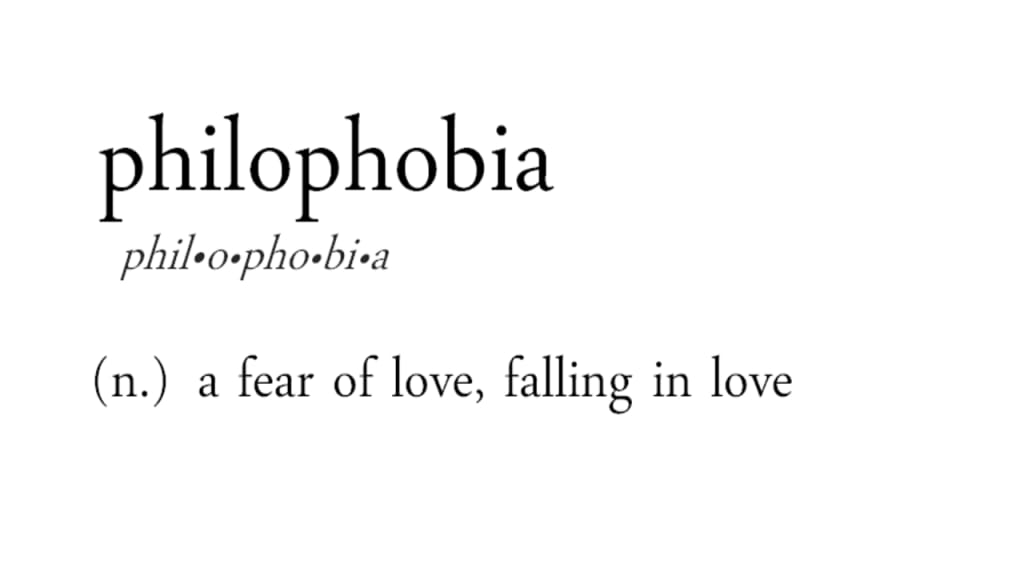Philophobia fear of falling in love
Philophobia fear of falling in love

Breaking the Chains of Fear: A Closer Look at Philophobia
Introduction
Love has the ability to unite people and forge strong bonds it is frequently regarded as the most profound and beautiful feeling. The concept of love, though, can be frightening and overwhelming for some people. Many people experience philophobia, an anxiety disorder characterized by an unreasonable and persistent dread of falling in love or developing an emotional bond. In this highly-rated article, we examine the complexities of phobia, as well as its sources, symptoms, and potential effects on people's lives.
Knowing about phobias
The Greek words philos, which means love and Phobos, which means fear are the origin of the word "philophobia." The fear of love must be distinguished from the fear of rejection because the former revolves around the idea of emotional attachment itself. Philophobia can appear as a deep-seated fear of openness intimacy or commitment which frequently causes people to completely avoid romantic relationships.
Causes and Influences
The reasons for phobias might differ from person to person, as they do with most phobias. Its growth may be influenced by a number of things including traumatic events previous heartbreaks or exposure to unhealthy relationships. The fear of love can also be greatly influenced by cultural and societal factors a fear of losing one's independence or a lack of trust.
Symptoms and manifestations
People who have phobias can experience a variety of mental and bodily symptoms. When faced with the prospect of emotional closeness these reactions can include an elevated heart rate sweating shaking shortness of breath, panic attacks and an overpowering sense of dread. They might also struggle to build strong ties and deal with emotional anguish and aversion to commitment.
Effects on Daily Life and Relationships
Philophobia can have a significant impact on many facets of a person's life. Relationships especially romantic ones can either be completely avoided or treated with great caution. This anxiety can result in seclusion loneliness and want for connection without the means to achieve it. It may also have an impact on one's self-esteem and impede personal growth.
Coping strategies and therapy
The first step in conquering philophobia is to recognize it and take action. Counseling or therapy from a skilled provider can offer insightful direction and support. Individuals can confront and reframe their fear-based beliefs with the use of cognitive-behavioral therapy (CBT) and exposure therapy procedures. To overcome philophobia, one can also practice self-love self-confidence building and gradual exposure to emotionally vulnerable situations.
The Road to Recovery
Philophobia recovery is a highly personal and unique process. It calls for endurance, compassion for oneself and a readiness to face one's worries. On this path it is crucial to practice self-reflection create relationships built on trust and open communication, and accept vulnerability. Support from loved ones, friends and mental health experts may be a tremendous help and source of inspiration.
Accepting Life and Love
It is imperative to keep in mind that love and emotional relationships are fundamental components of the human experience despite the fact that philophobia may be a strong obstacle. Getting over this fear can lead to tremendous happiness fulfillment and personal development. Phallophobic people can build meaningful relationships by accepting love taking chances, and learning from their past mistakes.
The signs and symptoms
a) Extreme anxiety: People who have philophobia may feel paralyzed with anxiety when exposed to romantic circumstances or conversations about love. Avoidance behaviors and social isolation may result from this.
b) Physical manifestations: Philophobia-related anxiety can cause physical symptoms including trembling, sweating, elevated heart rate and even panic attacks.
c) Emotional distress: Philophobia may result in feelings of despair annoyance or a sense of having missed out on a crucial component of the human experience.
Causes and Influences
a) Past traumatic events: People who have experienced heartache betrayal or violent relationships may develop a phobia of love and be anxious about suffering the same suffering again in the future.
b) Fear of vulnerability: Some people may be afraid of being emotionally open to being hurt or rejected because they see it as a sign of weakness. Low self-esteem or a lack of trust in other people may be the root of this anxiety.
c) Social and cultural influences: Philophobia may emerge as a result of societal pressure, unrealistic romantic ideals depicted in the media or cultural ideas about love and relationships.
Conclusion
Philophobia, or the fear of love can have a significant impact on a person's life. In order to support and empathize with those who are struggling with these issues it is essential to recognize and comprehend this condition. With the correct treatment strategies people may gradually face their anxieties, develop emotional self-control and prepare themselves for the prospect of love and satisfying relationships. Never forget that everyone can overcome their worries and that healing and progress are both possible.
About the Creator
Abdul Wahab
Passionate dreamer, eternal optimist on a self-discovery journey. Embracing life's possibilities, seeking growth and connections. Curious learner, nature lover, and creative soul. Let's navigate this beautiful tapestry together!






Comments
There are no comments for this story
Be the first to respond and start the conversation.